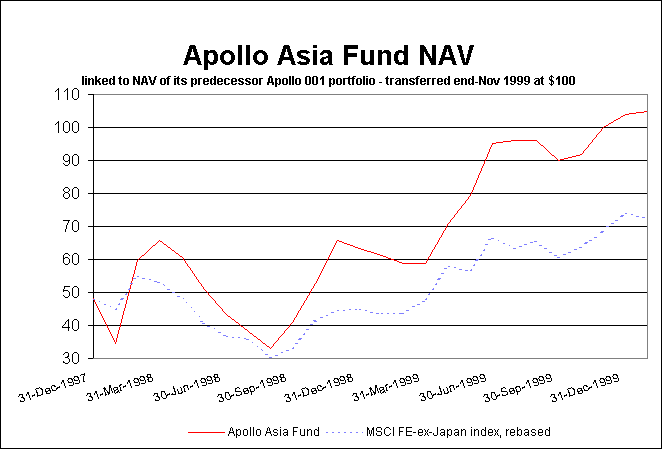Apollo
Investment Management
Excellent values for
interesting times
Apollo Asia Fund: the manager's 4Q99
report
The NAV of the Apollo Asia Fund was US$103.86 at the end of December
1999, after all deductions, from a starting level of US$100 at end-November
when the portfolio of the predecessor Apollo 001 Fund was folded in. Joining
the performance of the two funds, the gain in the fourth quarter was 15%,
making a total of 64% for the year.
In December especially, our performance lagged the market, as internet
plays of all kinds went berserk and some fund managers apparently rushed
to eliminate stodgy old value plays from their portfolios. We hope to have
the last laugh. Meanwhile we've survived the first turbulent week of the
year 2000 with an estimated 1% gain in net asset value, while the MSCI
index declined and many recent high-flyers headed rapidly earthwards. Our
chart below is as of the close on 7th January.

As of today, the ordinary shares in the portfolio (comprising 76% of
the total) are on an estimated PE of 7.8 for the next financial year to
be reported, which for most of our companies is the year ending December
1999 or March 2000. Looking one year ahead, the expected PE is 6.7, reflecting
estimated EPS growth of 18%. For those who prefer these figures the other
way up, the earnings yields are 13% almost-in-the-bag, and 15% prospective.
The fund currently has an unusually high 19% of its assets in bonds.
Our largest position is in Kazkommertsbank. When we bought this at $59
it offered a 19% running yield and a yield to maturity of over 40%, and
we considered the default risk to be low. Now the price is US$92.50 (after
paying two rounds of interest totalling US$11.25), but the running yield
is still only 12% and the yield to maturity in just over 16 months' time
is 18%. We still consider the default risk low and the value attractive.
Kazkommertsbank has itself been a buyer.
The rest of the fund is currently invested in Hong Kong and ASEAN; within
this "core" area our present weightings are Hong Kong 35%, Malaysia 24%,
Indonesia 19%, Thailand 15%, and Singapore 8%. These were derived by bottom-up
stock selection, not top-down allocation. Because we expect significant
inflows to the fund over the months ahead and some of our favourite stocks
are somewhat illiquid, I am not posting as many details on the website
as I might otherwise, but hope that the information given here is building
up over time to give a reasonable picture of investment style. I'm generally
delighted to discuss individual stocks in detail with our knowledgeable
investors and friendly competitors, but sometimes prefer to do this by
telephone or personal e-mail. Amongst our top holdings are Cafe de Coral,
MBK Properties, and Unilever Indonesia.
The expected dividend yield on the ordinary shares is 5.9% for the year
just ended, and 7.5% prospective. For the portfolio as a whole, including
not just the bonds but the cash (4%) and the non-dividend-paying closed-end
fund and warrants (less than 1%), the yields are 6.9% current and 8.2%
prospective. These figures are after all Asian taxes.
I'm ambivalent about the overall market outlook, with the economic and
corporate newsflow from Asia generally positive, but with unnerving risk
of major disruption when the US bubble eventually bursts. Our markets offer
attractive value on a relative basis, but to what extent they can decouple
is a moot point, and unlike most institutional investors we are interested
in absolute and not relative returns. Continued turbulence seems quite
probable, but the earnings quality of the companies in which we are invested
and their free cash flow (and hence their flexibility to self-finance and
to expand by acquisition), combined with current portfolio valuation, make
the risk-reward ratio look still quite attractive to me.
Claire Barnes, 9 January 2000
Previous reports:
